DISCoveries Editor's Corner - September 2009
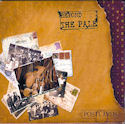 As the summer draws to a close one of the first significant events of the new season is the eighth annual Small World Music Festival which takes place September 24 through October 4. A highlight will be the October 1 performance by Toronto klezmer-fusion masters Beyond the Pale at the Lula Lounge. The band’s new album Postcards (Borealis BCD197 www.beyondthepale.net) is an eclectic collection of traditional material in new arrangements and original tunes by various members of the band, notably violin/violist Aleksandar Gajic, mandolin and cimbalom player Eric Stein and clarinettist Martin van de Ven. Milos Popovic, accordion, Bret Higgins, double bass, and Bogdan Djukic on violin and percussion, complete the mix, but among the most effective tracks are three on which the band is joined by vocalist Vira Lozinski. Lozinski is one of the leading voices in the new generation of singers cultivating Yiddish traditions in Israel and she provides a real sense of authenticity and is a perfect complement to the impeccable instrumetal musicianship displayed throughout this fine recording.
As the summer draws to a close one of the first significant events of the new season is the eighth annual Small World Music Festival which takes place September 24 through October 4. A highlight will be the October 1 performance by Toronto klezmer-fusion masters Beyond the Pale at the Lula Lounge. The band’s new album Postcards (Borealis BCD197 www.beyondthepale.net) is an eclectic collection of traditional material in new arrangements and original tunes by various members of the band, notably violin/violist Aleksandar Gajic, mandolin and cimbalom player Eric Stein and clarinettist Martin van de Ven. Milos Popovic, accordion, Bret Higgins, double bass, and Bogdan Djukic on violin and percussion, complete the mix, but among the most effective tracks are three on which the band is joined by vocalist Vira Lozinski. Lozinski is one of the leading voices in the new generation of singers cultivating Yiddish traditions in Israel and she provides a real sense of authenticity and is a perfect complement to the impeccable instrumetal musicianship displayed throughout this fine recording.
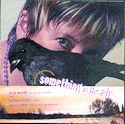 Something in the Air is a selection of flute music from Alison Melville’s Bird Project. Well-known for her virtuosity on recorders and baroque flutes this CD (Verdandi Music 0906 www.alisonmelville.com/bird) provides a glimpse into a number of other aspects of Melville’s world. Still performing on recorders and traverso, for the most part this repertoire is far from what we’d expect from a baroque specialist. The disc opens with Linda C. Smith’s tranquil Magnolia which segues seamlessly into Ben Grossman’s The Ill Fated Ornithopter, which in turn morphs into Melville’s take on Hildegard von Bingen’s O ignis spiritus and then a free improvisation between Melville’s flute and Grossman’s hurdy-gurdy. The third performer involved in the recording is narrator Kathleen Kajioka who is first heard reciting Lorna Crozier’s Tafelmusik-commissioned poem If Bach were a bird overlaid upon a traditional Shanghai opera melody and followed by a recorder rendition of Bach’s Gavotte from BWV 1006. This is just a taste of the eclectic delights on offer throughout this disc. Other jewels include two “Bento boxes” comprised of Japanese Haiku interspersed with improvised instrumental sections; Ben Grossman’s electronic Birdddub and unusual baroque selections including Jakob van Eyck’s The Little English Nightingale and the anonymous Bird Fancier’s Delight from 1717 in which we are presented with pieces to teach to wild birds - five ditties intended for the instruction of nightingales, canaries, starlings, woodlarks and parrots. Concert note: The Bird Project will present two concerts and a guided nature walk at Todmorden Mills Heritage Museum and Arts Centre, beginning at noon on September 19.
Something in the Air is a selection of flute music from Alison Melville’s Bird Project. Well-known for her virtuosity on recorders and baroque flutes this CD (Verdandi Music 0906 www.alisonmelville.com/bird) provides a glimpse into a number of other aspects of Melville’s world. Still performing on recorders and traverso, for the most part this repertoire is far from what we’d expect from a baroque specialist. The disc opens with Linda C. Smith’s tranquil Magnolia which segues seamlessly into Ben Grossman’s The Ill Fated Ornithopter, which in turn morphs into Melville’s take on Hildegard von Bingen’s O ignis spiritus and then a free improvisation between Melville’s flute and Grossman’s hurdy-gurdy. The third performer involved in the recording is narrator Kathleen Kajioka who is first heard reciting Lorna Crozier’s Tafelmusik-commissioned poem If Bach were a bird overlaid upon a traditional Shanghai opera melody and followed by a recorder rendition of Bach’s Gavotte from BWV 1006. This is just a taste of the eclectic delights on offer throughout this disc. Other jewels include two “Bento boxes” comprised of Japanese Haiku interspersed with improvised instrumental sections; Ben Grossman’s electronic Birdddub and unusual baroque selections including Jakob van Eyck’s The Little English Nightingale and the anonymous Bird Fancier’s Delight from 1717 in which we are presented with pieces to teach to wild birds - five ditties intended for the instruction of nightingales, canaries, starlings, woodlarks and parrots. Concert note: The Bird Project will present two concerts and a guided nature walk at Todmorden Mills Heritage Museum and Arts Centre, beginning at noon on September 19.
I must confess I don’t quite know what to make of the latest Centrediscs release, P*P (CMCCD 15009) from Toronto’s Toca Loca. This unusual ensemble – Gregory Oh and Simon Docking, pianos and Aiyun Huang, percussion – is a relative newcomer on the Toronto contemporary scene. But since its inception in 2001 Toca Loca has established itself as a vibrant and dynamic force to be reckoned with. High performance standards and the ensemble’s international reach has resulted in some of the most memorable and entertaining performances of serious, and seriously witty, contemporary music in Toronto in recent years. Although they have worked with some of the country’s finest young singers, for this project all the vocals – and vocalisms – are provided by the members of the ensemble. There is no singing per se, but certainly a lot of recitation, declamation and exclamation – well, yelling actually. The strident tone is set by the opening track, Canadian performance artist Myra Davies’ No Time, a clever take on a common modern circumstance performed at breakneck speed by Gregory Oh. Most of the other works are by “serious” composers of Toca Loca’s generation – 30 to 40 something – including Aaron Gervais, Juliet Palmer, Andrew Staniland, Veronika Krausas, Erik Ross and Nicole Lizée. Perhaps the most disturbing is Staniland’s Made in China which is given 2 distinctly different interpretations in male and female renditions, although alt-pop singer-songwriter Laura Barrett’s Robot Ponies runs a close second, for very different reasons. Quinsin Nachoff’s Toca Loca juxtaposes piano with Fender Rhodes and vibraphone in a world that spans jazz and pop inflection to create something at once familiar and “wondrous strange”, something that could be said of this whole disc. But what’s with the packaging? The 20 page booklet contains only minimal program notes and no biographical material but does include a graphic novel of sorts which at time of writing still remains a mystery to me.
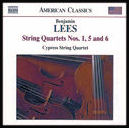 Thanks to Naxos I may remember 2009 as “the summer of the string quartet”, with new releases by several intriguing and lesser known 20th century composers. The Cypress Quartet’s recording of Benjamin Lees’ String Quartets Nos. 1, 5 and 6 (8.559628) is a great introduction to the chamber music of a composer better known for Grammy nominated larger works, Symphony No. 5 and the Violin Concerto. The quartets date from 1952, 2002 and 2005 and give a good idea of where Lees was coming from – he was 28 when the first quartet was written – and where is now. Interestingly, the fifth was written for the Cypress Quartet’s “Call and Response” series, where a composer is asked to create a work influenced by two standard quartet pieces which would be performed alongside the premiere, in this case quartets of Shostakovich and Britten. The lyricism of this work is juxtaposed with the more abrasive Sixth Quartet.
Thanks to Naxos I may remember 2009 as “the summer of the string quartet”, with new releases by several intriguing and lesser known 20th century composers. The Cypress Quartet’s recording of Benjamin Lees’ String Quartets Nos. 1, 5 and 6 (8.559628) is a great introduction to the chamber music of a composer better known for Grammy nominated larger works, Symphony No. 5 and the Violin Concerto. The quartets date from 1952, 2002 and 2005 and give a good idea of where Lees was coming from – he was 28 when the first quartet was written – and where is now. Interestingly, the fifth was written for the Cypress Quartet’s “Call and Response” series, where a composer is asked to create a work influenced by two standard quartet pieces which would be performed alongside the premiere, in this case quartets of Shostakovich and Britten. The lyricism of this work is juxtaposed with the more abrasive Sixth Quartet. ![]()
@Grigorian.Com
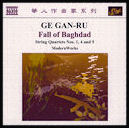 Touted as China’s “first avant-garde composer”, Ge Gan-Ru is a name which I had not encountered before the release of Fall of Baghdad – String Quartets Nos. 1, 4 and 5 (Naxos 8.570603) performed by ModernWorks. Born in Shanghai in 1954, his violin studies were interrupted by the Cultural Revolution. In 1974 when the Shanghai Conservatory re-opened he returned, switching his major to composition three years later. His first major work, Yi Feng (Lost Style) for “radically detuned cello”, was received with consternation and criticism, but established him as a pioneer. This was followed by his first string quartet Fu (Prose-Poem) which was a work-in-progress when he was invited to New York to study with Chou Wen-chung at Columbia University in 1982. Fu was picked up by the Kronos Quartet shortly after its completion and Ge went on to receive his doctorate from Columbia in 1991 and continues to live in the USA. This CD presents distinctly different quartets from 1983 (Fu), 1998 (Angel Suite) and 2007 (The Fall of Baghdad), providing glimpses into the development of this multi-faceted and culturally innovative composer.
Touted as China’s “first avant-garde composer”, Ge Gan-Ru is a name which I had not encountered before the release of Fall of Baghdad – String Quartets Nos. 1, 4 and 5 (Naxos 8.570603) performed by ModernWorks. Born in Shanghai in 1954, his violin studies were interrupted by the Cultural Revolution. In 1974 when the Shanghai Conservatory re-opened he returned, switching his major to composition three years later. His first major work, Yi Feng (Lost Style) for “radically detuned cello”, was received with consternation and criticism, but established him as a pioneer. This was followed by his first string quartet Fu (Prose-Poem) which was a work-in-progress when he was invited to New York to study with Chou Wen-chung at Columbia University in 1982. Fu was picked up by the Kronos Quartet shortly after its completion and Ge went on to receive his doctorate from Columbia in 1991 and continues to live in the USA. This CD presents distinctly different quartets from 1983 (Fu), 1998 (Angel Suite) and 2007 (The Fall of Baghdad), providing glimpses into the development of this multi-faceted and culturally innovative composer.![]()
@Grigorian.Com
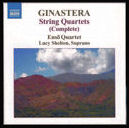 Better known, but still not a household name, is the Argentine composer Alberto Ginastera. Although considered one of the most important South American composers, his reputation has been overshadowed by his student Astor Piazzolla and perhaps his brightest moment in the sun was Emerson, Lake and Palmer’s 1973 recording of Toccata, an adaptation of the finale from Ginastera’s first piano concerto, on “Brain Salad Surgery”. Welcome then is the Ensö Quartet’s recording of the Complete String Quartets (8.570780). Dating from 1948, 1968 and 1973 the three quartets span much of Ginastera’s creative career. For the final work the quartet is joined by soprano Lucy Shelton in three of the five movements which feature texts by Juan Ramón Jiménez and Federico Garcia Lorca.
Better known, but still not a household name, is the Argentine composer Alberto Ginastera. Although considered one of the most important South American composers, his reputation has been overshadowed by his student Astor Piazzolla and perhaps his brightest moment in the sun was Emerson, Lake and Palmer’s 1973 recording of Toccata, an adaptation of the finale from Ginastera’s first piano concerto, on “Brain Salad Surgery”. Welcome then is the Ensö Quartet’s recording of the Complete String Quartets (8.570780). Dating from 1948, 1968 and 1973 the three quartets span much of Ginastera’s creative career. For the final work the quartet is joined by soprano Lucy Shelton in three of the five movements which feature texts by Juan Ramón Jiménez and Federico Garcia Lorca.
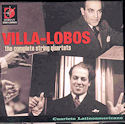 Speaking of South American composers, five years ago in this column I mentioned that the Cuarteto Latinoamericano recordings of the Complete String Quartets of Heitor Villa-Lobos originally released on Dorian had been re-issued on the budget Brilliant label. I am now pleased to report that Dorian has been reincarnated as Dorian sono luminus and those recordings have been re-released as a 6 CD set (DSL-90904) with a new bonus DVD featuring video of the first string quartet and the Cuarteto members discussing the importance of Villa-Lobos and his cycle of 17 string quartets. Priced at about $6 a disc this is a set to treasure.
Speaking of South American composers, five years ago in this column I mentioned that the Cuarteto Latinoamericano recordings of the Complete String Quartets of Heitor Villa-Lobos originally released on Dorian had been re-issued on the budget Brilliant label. I am now pleased to report that Dorian has been reincarnated as Dorian sono luminus and those recordings have been re-released as a 6 CD set (DSL-90904) with a new bonus DVD featuring video of the first string quartet and the Cuarteto members discussing the importance of Villa-Lobos and his cycle of 17 string quartets. Priced at about $6 a disc this is a set to treasure. ![]()
@Grigorian.Com
We welcome your feedback and invite submissions. CDs and comments should be sent to: The WholeNote, 503 – 720 Bathurst St. Toronto ON M5S 2R4.
David Olds
DISCoveries Editor
discoveries@thewholenote.com


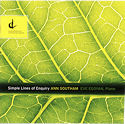
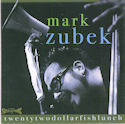
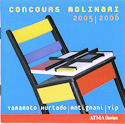

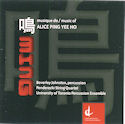
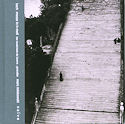
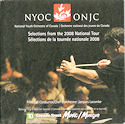 Last month the National Youth Orchestra of Canada announced the 100 members of the 2009 edition of the orchestra selected from some 550 applicants across the county. If Selections from the 2008 National Tour (NYOC2008CD
Last month the National Youth Orchestra of Canada announced the 100 members of the 2009 edition of the orchestra selected from some 550 applicants across the county. If Selections from the 2008 National Tour (NYOC2008CD 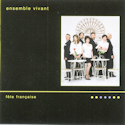 Française (Opening Day ODR 9379
Française (Opening Day ODR 9379